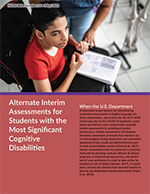Students with the most significant cognitive disabilities participate in state summative assessments by taking alternate assessments based on alternate academic achievement standards (AA-AAAS). But what happens the rest of the year? What tools do educators have to track progress, inform instruction, and make adjustments along the way? In 2021, NCEO Brief #23, Alternate Interim Assessments for Students with the Most Significant Cognitive Disabilities, highlighted a major gap in current assessment systems that still exists today: the lack of interim assessments designed specifically for students who take AA-AAAS. While general education students often benefit from interim assessments to monitor learning throughout the year, these tools are largely unavailable or inappropriate for students with the most significant cognitive disabilities.
The Brief explains why this matters. Interim assessments help educators monitor student progress toward academic standards, identify areas of needed instructional support, and provide timely feedback that shapes teaching and learning. However, most commercially available interim assessments lack the accessibility features and alignment to alternate content standards needed for this student population. As a result, students with the most significant cognitive disabilities may be excluded from critical instructional planning and data-based decision-making. The Brief outlines key considerations for developing alternate interim assessments, including:
- Alignment with alternate academic achievement standards,
- Use of familiar response modes (e.g., eye gaze, pointing),
- Accessibility and usability for both students and teachers, and
- Connection to instruction, not just accountability.
The authors also encourage states to explore strategies such as adapting existing interim assessments, collaborating with vendors to develop new tools, and sharing approaches across states and consortia.
If your state is working to build more inclusive assessment systems, this Brief is a valuable resource. Ensuring that all students—including those with the most significant cognitive disabilities—have access to meaningful interim assessments continues to be essential for supporting instruction, promoting participation, and improving educational outcomes.

